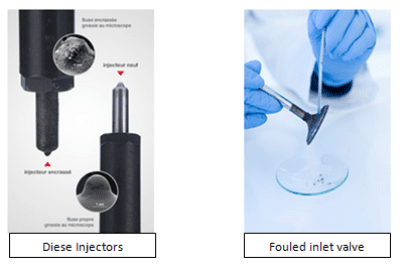Evidence
PROOFS, TESTS… EVERYTHING YOU NEED TO KNOW ABOUT EXCELLIUM FUELS

Why has the formula of EXCELLIUM fuels evolved?
Vehicles have evolved immensely in order to adapt to the new emission control standards (and especially Euro 6). New engines are therefore more and more demanding concerning fuel (temperature and high pressures).
-
Injectors are the key components of diesel engines, they must remain clean during the lifetime of the vehicle in order to maintain the performance of the engine over time.
-
With the emergence of indirect injection systems for petrol engines, it is necessary to preserve the sensitive components such as injectors.
-
Indirect injection petrol engines continue to develop, and new constraints appear with variable valve lift technologies.
-
The number of Stop & Start vehicles and hybrid vehicles is increasing, and these new technologies are more complex and more sensitive to fouling.
-
A fuel must answer effectively the needs of every engine and of every technology, whether old or new.

Engine cleanliness, what is it exactly?

For petrol engines: EXCELLIUM 98 prevents up to 99% (1) of inlet valves fouling on indirect injection engines. It keeps the admission system clean. It enables to clean up to 90% (2) of existing fouling on the inlet valves. EXCELLIUM 98 prevents up to 79% (3) of injector fouling on direct injection engines. It enables to clean up to 51%(3) of existing fouling on the injectors.

For diesel engines: EXCELLIUM DIESEL prevents up to 93%(4) of injector fouling. It enables to clean up to 45% (4) of existing fouling from the second tankfull. EXCELLIUM DIESEL protects the injectors of not only the most recent engines, but also of the older types of engines against all types of fouling (5). By providing enhanced filterability, EXCELLIUM DIESEL protects the diesel filter against premature clogging.

How can a fuel maintain engine performance over time?
Regular use of EXCELLIUM fuels allows to keep the injection system and the inlet valves clean.
- For petrol engines : by keeping the engine admission system clean, EXCELLIUM 98 allows to maintain excellent quality of air/fuel mixing, and therefore preserves the performances of your engine over its lifetime.
- For diesel engines: EXCELLIUM DIESEL allows to maintain the power of your engine over time thanks to the protection of the injectors against all types of deposits. In the case of indirect injection diesel engine, its use enables to restore engine power in 6 hours only (6).


And what about consumption reduction?
A fouled engine can increase the fuel consumption of your engine, this is why it is essential to keep it clean to maintain its efficiency. The combination of detergent, friction-reducing technologies and combustion improver (for diesel engines only) makes for a reduction in your fuel consumption.

Are polluting emissions reduced with all the products of the EXCELLIUM range?
Indeed, using whether EXCELLIUM 98 or EXCELLIUM DIESEL, CO2 emissions are directly reduced thanks to the reduction in consumption.
The use of EXCELLIUM DIESEL has allowed an average reduction of 22% of the carbon monoxide and unburnt hydrocarbons emissions of several vehicles right from the first tankfull. Reductions of up to 37% in Carbon Monoxide (CO) and up to 39% in unburnt hydrocarbons (HC) have been demonstrated (7).
1) By comparison with a fuel with no specific additives, tests carried out in July 2013 on an indirect injection engine on a test bench in compliance with the reference method CEC F-05-93. Results may vary depending on the type of vehicle.
2) By comparison with a fuel with no specific additives, test performed by an external body in August 2013 on a indirect injection engine on a test bench in compliance with the reference method CEC F-05-93. Results may vary depending on the type of vehicle.
3) By comparison with a fuel with no specific additives, tests carried out in July 2013 on an indirect injection engine on a test bench using a method provided by the Total Research Center. Results may vary depending on the type of vehicle.
4) By comparison with a fuel with no specific additives, tests performed in July 2013 on an indirect injection engine on a test bench in compliance with the reference method CEC F-23-A-01. Results may vary depending on the type of vehicle.
5) By comparison with a fuel with no specific additives, several tests were performed: tests carried out in September and October 2013 on an indirect injection engine on a test bench in compliance with the reference method CEC F-98-08, and tests carried out in September 2013 using a method provided by the Total Research Center. Results may vary depending on the type of vehicle.
6) By comparison with a fuel with no specific additive, test performed in September and October 2013 on a direct injection engine on a test bench in compliance with the reference method CEC F-98-08. Results may vary depending on the type of vehicle.
7) By comparison with a fuel with no specific additive, test performed in 2014 on several vehicles on a roller test bench compliance with the Artemis cycle (representative of an average real drive) with an analysis of results coming from the urban phase. Results may vary according to the type of vehicle.

